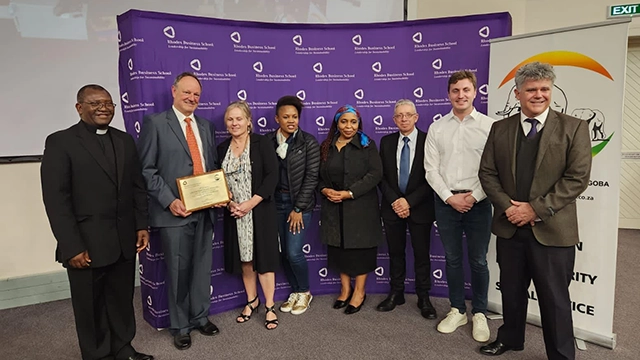
By Mathews Nthinya
On 05 October 2023, the Rhodes Business School hosted its 9th Annual Archbishop Thabo Makgoba Trust Lecture in the Eden Grove Lecture Theatre to explore values-based leadership and its impact on sustainable business practices in our complex, ever-evolving world.
Historically, the lecture series has attracted distinguished speakers, and this year was no different: civil activist and current CEO of the South African corruption-fighting Organisation Undoing Tax Abuse, Mr Wayne Duvenage, was this year's speaker. He embodies the values cherished by the Archbishop Makgoba Development Trust: integrity, compassion, and an unwavering commitment to societal betterment.
The evening's events got underway when Professor Owen Skae, Director of the School, warmly welcomed everyone in attendance. He played a video greeting from Archbishop Thabo Makgoba, who expressed his profound regrets for not attending in person due to prior commitments in Rome, where he was supporting a friend's promotion to the cardinal rank and getting ready to take part in the Pope's upcoming introduction ceremony.
Archbishop Makgoba stressed the Trust's commitment to creating a better society by supporting robust discussions, cultivating introspection, and promoting group engagement. His final words were a passionate "God bless" and hearty congratulations as he addressed those who might win the Archbishop Thabo Makgoba Responsible Leadership Essay Prize, given out later that evening.
Following this heartfelt message, Professor ‘Mabokang Monnapula-Mapesela, Rhodes University's Deputy Vice-Chancellor of Academic and Student Affairs, urged the audience to participate in Mr Duvenage's address. "Ask probing questions, seek clarity, and learn more about values-based leadership," she said.
Her remarks rang true as she challenged people to consider how these ideals may be used in the real world to help create a more just, equal, and compassionate world. The College of Transfiguration's rector, Dr Percy Chinganga, had a brief turn on stage after that to deliver a moving prayer that set the mood for the rest of the evening's conversations.
Mr Duvenage approached the platform to emphasise the importance of the subjects to be covered. He called attention to the troubling drop in the mining industry's contributions to corporate income taxes. He emphasised the reality that everyone indirectly pays to taxation through various mechanisms, regardless of their source of income. In addition, Professor Skae outlined the systemic difficulties Eskom encountered, particularly its colossal debt load of R423 billion. Compared to South Africa's Gross Domestic Product (GDP), this debt comprised 36%. Additionally, he disclosed that the government's commitment to paying down this debt constituted a sizeable payment of R254 billion, with an initial payment of more than R16 billion—an amount greater than the sum of corporate income tax paid by all businesses in South Africa.
Mr Duvenage launched into a provocative speech about the enormous benefits of values-based leadership on company culture. He emphasised the critical need to make strategic decisions firmly anchored in ethics and moral principles in today's complex and multidimensional corporate world. He urged CEOs to consider the far-reaching repercussions of their decisions on people, society, and the environment to widen their perspective beyond the boundaries of shareholder interests. He introduced the audience to the stakeholder matrix technique, often known as the triple P process, to help clarify this idea. This method allows for a thorough evaluation of an organisation's influence beyond financial factors.
Mr Duvenage provided engrossing anecdotes based on his own experiences while serving as the CEO of Avis Rent-a-Car from 2007 to 2010—a period preceding South Africa's historic hosting of the FIFA World Cup.
He talked about how his leadership team undertook a path of increased awareness, realising their company's wider influence, including problems like electricity usage and water wastage. This newly acquired knowledge led to a change in corporate citizenship and the beginning of a sustainable journey.
Notably, they made the shocking realisation that their water usage was much higher than anticipated. For instance, instead of the previously believed 20 litres, each car-washing session used an average of 180 litres. Armed with this paradigm-shifting information, they persuaded shareholders to invest in multi-million rand water recycling facilities at four depots, leaving an enduringly positive legacy for both people and the environment.
While reiterating that there is nothing fundamentally wrong with businesses aiming to increase shareholder rewards, Mr Duvenage warned about the danger of this goal obscuring the more important one of helping the community and society. He cautioned that prioritising shareholder gains could create a "winner-takes-it-all" mentality, ultimately encouraging corruption and social injustice.
Mr Duvenage also provided a persuasive critique of corporate reporting practices, which frequently depended on vanity metrics. He claimed that these measurements concealed the genuine state of firms, helped inflate their successes, and shielded institutional shareholders from the complex realities. He fervently promoted the adoption of moral leadership in the political sphere and creating sound economic policies. He argued that such actions may have significantly lowered South Africa's unemployment rate, accelerated GDP development, and given fresh life to crucial sectors like manufacturing, tourism, logistics, and mining.
When Professor David Sewry, Dean of the Faculty of Commerce, stood up to reveal the esteemed 2023 Archbishop Thabo Makgoba Responsible Leadership Essay Prize winner, the evening reached its apex. He gave a succinct but glowing tribute before announcing Kurt Van Staden as the deserving winner of this prestigious award.
To conclude the programme, Boni Mchunu, the president of the 2022 MBA class, gave a sincere thank-you speech. The audience left with expanded minds and a renewed commitment to honesty, compassion, and responsible leadership, charting the path to a more promising and sustainable future.
